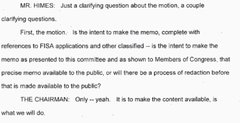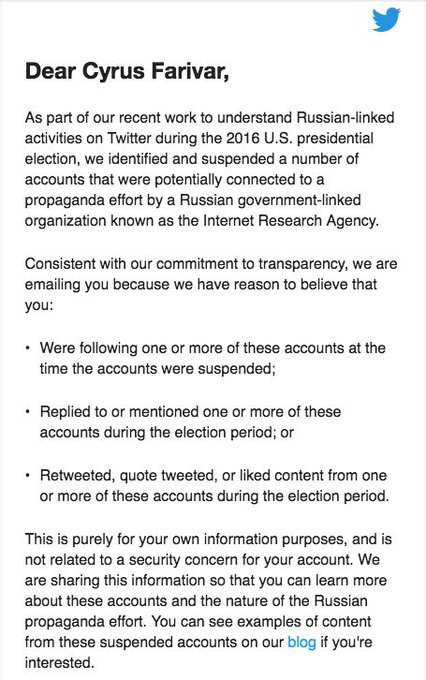The following article by James Hohmann with was posted on the Washington Post website February 1, 2018:
The Washington Post’s Devlin Barrett analyzes the disagreements between the FBI and the White House over a memo alleging surveillance abuse by the FBI. (Bastien Inzaurralde/The Washington Post)
THE BIG IDEA: The classified memo written by Republican staffers for Rep. Devin Nunes (R-Calif.) could be released as early as today, despite an FBI statement expressing “grave concerns” and complaints from Democrats that it’s been materially altered at the last minute.
Senior White House officials and advisers say that President Trump wants the document published because he sees it as key to making changes at the Justice Department, particularly pushing out Deputy Attorney General Rod Rosenstein, who oversees special counsel Robert Mueller’s investigation.
“Few things have frustrated Trump as much as the law enforcement agencies he cannot fully control,” Josh Dawsey, Devlin Barrett and Karoun Demirjian report. “Allies say he is upset that he can’t control ‘my guys’ at the ‘Trump Justice Department’ and that no one seems particularly loyal to him. He has also broken long-held protocols by directly calling Justice Department officials, and instructed his chief of staff to do the same, without the White House counsel on the phone.
“The FBI’s public warning came after several days of failed attempts by FBI Director Christopher A. Wray and other Justice Department officials to convince the president and his senior staff in private meetings that the memo should be blocked because it poses a risk to national security,” they add. “Justice Department officials have been leery of talking to Trump about the memo, given the ongoing Russia inquiry … Officials said the FBI issued the statement knowing that it would probably not affect the decision.”
— Do not assume this fiasco will backfire on Republicans. It’s going to be very hard for members of the intelligence community and Democrats to push back on the information in the memo after it comes out because doing so would require the disclosure of even more sensitive information about sources and methods. And Trump defenders will get fodder to question the integrity of the underlying probe.
A Johns Hopkins professor who spent more than three decades at the CIA, including as acting director, explains:
Rep. Adam B. Schiff (D-Calif.) says the House Intelligence Committee vote to release documents alleging abuse in the FBI’s Russia probe marks a “very sad day.” (The Washington Post)
— Rep. Adam Schiff (D-Calif.) said last night that Nunes made “material changes” to the memo after the House Intelligence Committee, on a party line vote, approved its release. He said members “were never apprised of, never had the opportunity to review, and never approved” these alterations. A spokesman for the GOP majority said only “minor edits” were made. A senior Democratic committee official told Karoun they were “not cosmetic” and attempt “to water down some of the majority’s assertions.”
“As Mueller and his team move closer to the president and his inner circle, a sense of panic is palpable on the Hill. GOP members recognize that the probe threatens not only the president but also their majorities in Congress,” Schiff writes in an op-ed for today’s newspaper. “In response, they have drawn on the stratagem of many criminal defense lawyers — when the evidence against a defendant is strong, put the government on trial.”
Rep. Jim Himes (D-Conn.) flagged a key exchange from the transcript:
— An open question: Did Nunes’s staff work with the Trump administration to orchestrate the release of the memo? A transcript of a Monday night closed-door meeting, which was released publicly yesterday, showed that Rep. Mike Quigley (D-Ill.) asked Nunes if he coordinated with Trump’s team. “As far as I know, no,” he replied. But he would not answer when asked if his staff had done so. White House press secretary Sarah Huckabee Sanders said yesterday only that she was “not aware of any conversation or coordination” between Nunes and the White House. “I just don’t know the answer,” she said, not ruling it out.
Before it came out that President Trump sought to fire Robert Mueller last June, Trump and his aides repeatedly said he wasn’t giving “any thought” to the idea. (Video: Jenny Starrs/Photo: Jabin Botsford/The Washington Post)
ANOTHER LOYALTY TEST:
— Trump asked Rosenstein if he was “on my team,” according to CNN. The deputy attorney general visited the White House in December seeking Trump’s help in fighting off the document demands from Nunes. “But the President had other priorities ahead of a key appearance by Rosenstein on the Hill,” sources told Pamela Brown, Evan Perez and Laura Jarrett. “Trump wanted to know where the special counsel’s Russia investigation was heading. And he wanted to know whether Rosenstein was ‘on my team.’ …. [Rosenstein] demurred on the direction of the Russia investigation … And he responded awkwardly to the President’s ‘team’ request … ‘Of course, we’re all on your team, Mr. President,’ Rosenstein told Trump…
“Rosenstein’s meeting with the President came as Rosenstein prepared to testify before the House Judiciary Committee. Trump appeared focused on Rosenstein’s testimony … and he brought it up … As a further sign of the President’s focus on Rosenstein’s testimony, one of the sources said Trump also had suggested questions to members of Congress that they could ask Rosenstein. … One line of inquiry Trump proposed lawmakers ask about was whether Rosenstein appointed Mueller as special counsel to investigate Russian meddling in the 2016 election because Mueller was not selected as FBI director. … Sources say Trump believes Rosenstein was upset Mueller wasn’t selected as FBI director and responded by making him special counsel. … At the hearing, Rosenstein repeatedly declined to say whether Trump had ever asked him about the Russia Investigation.”
— “With FBI statement on memo, Christopher Wray could now be in the president’s crosshairs,” by Matt Zapotosky: “Wray, who worked as a top Justice Department official during the George W. Bush administration and left a law firm position to lead the FBI, has had to defend himself and the bureau from Trump’s attacks before. He appeared before the House Judiciary Committee not long after the president tweeted that his agency’s reputation was in ‘tatters,’ telling legislators, ‘The FBI that I see is people, decent people, committed to the highest principles of dignity and professionalism and respect.’
“He has shown a willingness to consider resigning when the department is under political pressure.When [James] Comey in 2004 was prepared to quit as the deputy attorney general over concerns about reauthorization of a secretive domestic surveillance program, Wray approached him in the hall at the Justice Department and said, ‘Look, I don’t know what’s going on, but before you guys all pull the rip cords, please give me a heads-up so I can jump with you,’ according to an account of the incident in the Washingtonian magazine.”
Created by Rep. Devin Nunes (R-Calif.), the four-page memo is critical of the Justice Department and the FBI’s handling of the Russia investigation. (Video: Victoria Walker/Photo: Jabin Botsford/The Washington Post)
HOW IT’S PLAYING:
— Here are 10 more thought-provoking takes on what’s going on:
Former intelligence officer Paul Pillar in the National Interest: “The Damaging Decline of HPSCI.”
USC Law professor Orin Kerr on Lawfare: “The Dubious Legal Claim Behind #ReleaseTheMemo.”
Charlie Savage in the New York Times: “The Real Aim of the Nunes Memo Is the Mueller Investigation.”
Harvard Law professor Noah Feldman on Bloomberg View: “The FBI Stands Up to Trump’s Efforts to Politicize It. Director Wray is pushing back against the release of the House memo because it would destroy another investigative norm.”
Norm Eisen, Caroline Fredrickson and Noah Bookbinder in Politico Magazine: “Trump’s Saturday Night Massacre Is Happening Right Before Our Eyes. The aim of the campaign against the Mueller investigation and the FBI is clear: Obstructing justice.”
Mueller biographer Garrett Graff in Wired: “Here’s what happens if ‘magnificent bastard’ Mueller gets fired.”
Trump biographer Michael D’Antonio on CNN.com: “Trump is on a Nixonian collision course with the FBI.”
David Graham in The Atlantic: “The Peril of Taking on the FBI. Trump’s attacks on law-enforcement agencies were followed by an unusual statement from the bureau, and a series of damaging leaks.”
Noah Rothman in Commentary Magazine: “The Concerns in the ‘Memo’ Are Serious, but the Handling of It Isn’t. Serious issues deserve serious people.”
A. Barton Hinkle in the libertarian Reason Magazine: “Trump’s Turned Republicans Into Everything They Once Hated.”
MEANWHILE, MUELLER ZEROES IN:
— The New York Times reports that the special counsel is looking very closely at the president’s role in the writing of a statement about his son’s June 2016 meeting with a lawyer who promised dirt about Hillary Clinton from the Russian government: “Aboard Air Force One on a flight home from Europe last July, President Trump and his advisers raced to cobble together a news release … Rather than acknowledge the meeting’s intended purpose … the statement instead described the meeting as being about an obscure Russian adoption policy. … Prosecutors working for Mr. Mueller in recent months have questioned numerous White House officials about how the release came together — and about how directly Mr. Trump oversaw the process. Mr. Mueller’s team recently notified Mr. Trump’s lawyers that the Air Force One statement is one of about a dozen subjects that prosecutors want to discuss in a face-to-face interview of Mr. Trump that is still being negotiated.
“In the plane’s front cabin, Mr. Trump huddled with Ms. Hicks. During the meeting … Ms. Hicks was sending frequent text messages to Donald Trump Jr., who was in New York. Alan Garten, a lawyer for the younger Mr. Trump who was also in New York, was also messaging with White House advisers aboard the plane. The president supervised the writing of the statement, according to three people familiar with the episode, with input from other White House aides. A fierce debate erupted over how much information the news release should include. Mr. Trump was insistent about including language that the meeting was about Russian adoptions …”
“The latest witness to be called for an interview about the episode was Mark Corallo, who served as a spokesman for Mr. Trump’s legal team before resigning in July. Mr. Corallo received an interview request last week from the special counsel and has agreed to the interview … Mr. Corallo is planning to tell Mr. Mueller about a previously undisclosed conference call with Mr. Trump and Hope Hicks, the White House communications director … Mr. Corallo planned to tell investigators that Ms. Hicks said during the call that emails written by Donald Trump Jr. before the Trump Tower meeting — in which the younger Mr. Trump said he was eager to receive political dirt about Mrs. Clinton from the Russians — ‘will never get out.’ That left Mr. Corallo with concerns that Ms. Hicks could be contemplating obstructing justice … In a statement on Wednesday, a lawyer for Ms. Hicks strongly denied Mr. Corallo’s allegations.
“Some lawyers and witnesses who have sat in or been briefed on the interviews have puzzled over Mr. Mueller’s interest in the episode. Lying to federal investigators is a crime; lying to the news media is not. For that reason, some of Mr. Trump’s advisers argue that Mr. Mueller has no grounds to ask the president about the statement and say he should refuse to discuss it.”
— “In the last quarter of 2017, Trump’s campaign committee spent $1.1 million in legal fees — 41 percent of its total expenses. In the previous three quarters, the committee spent a total of $2 million,” per Michelle Ye Hee Lee and Anu Narasyanswamy. “Trump entered 2018 with more than $32 million in the coffers of his reelection campaign and two affiliated committees.”



